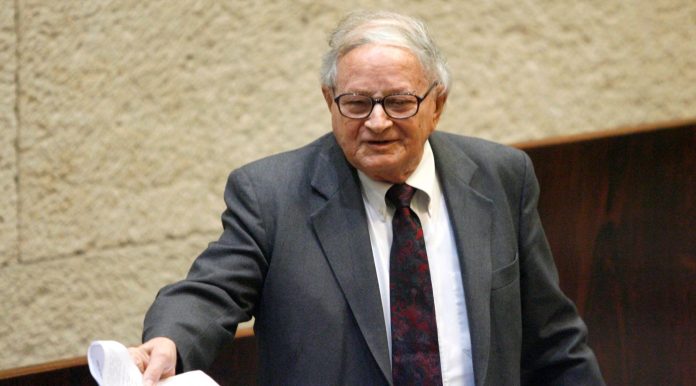
Senior politicians have paid moving tributes to Mossad spy Rafi Eitan following his death aged 92 on Saturday.
Eitan famously led a historic mission in Argentina to capture Nazi killer Adolf Eichmann in 1960.
A key architect of Hitler’s ‘final solution’ during the Holocaust, Eichmann was convicted of war crimes in Israel in 1961 and hanged a year later.
Eichmann’s execution at Ramle jail in 1962 is the only time Israel has carried out a death sentence.
Eitan, who died at Tel Aviv’s Sourasky Medical Center on Saturday, was a founder of Israel’s intelligence service, went on to form a political party and served as a cabinet minister.
“Rafi was among the heroes of the intelligence services of the State of Israel on countless missions on behalf of the security of Israel,” said Prime Minister Benjamin Netanyahu.
“His wisdom, wit and commitment to the people of Israel and our state were without peer.”
President Reuven Rivlin added, “We have lost a brave fighter whose contribution to Israel’s security will be taught for generations to come.
“Rafi was a born fighter who stuck to his mission and to what he knew to be right. Our heads are bowed today in his memory, and in deep appreciation.”
Mossad Director Yossi Cohen said most of Eitan’s exploits remain unknown to the general public.
“His work and his actions will be etched in gold letters in the annals of the state,” Cohen said in a special statement. “The foundations Rafi laid in the first years of the state are a significant layer in the activities of the Mossad even today.”
Speaking at his funeral on Sunday, Olmert said Eitan, who served as his Senior Citizen Affairs Minister was the most “intelligent, competent, responsible and creative ministers” in his government.
World Jewish Congress said Eitan was a founder of the State of Israel’s intelligence community.
“Without Eitan, one of the masterminds of the Holocaust that decimated European Jewry might never have been brought to justice,” commented WJC President Ronald S. Lauder.
“Rafi fought endlessly and tirelessly across continents to ensure that those responsible for the deaths of millions of Jews and the attempted destruction of millions more be brought to trial and punished.
“He was also a champion in the struggle for the restitution of Holocaust-era Jewish property who devoted himself to restoring a modicum of dignity for the victims and their families.”
Lauder added, “He was a dedicated soldier who risked his life for the Jewish people and the State of Israel.”
Born at Kibbutz Ein Harud, near Mt. Gilboa in northern Israel, Eitan was educated in Ein Hashlosha and fought for the Palmach pre-state army, studying intelligence and combat.
Wounded during the War of Independence in 1948, his partial loss of hearing earned him the nickname, “Stinky Rafi,” after hiding in a sewage pit on a mission.
Lifelong friend Ariel Sharon affectionately called him “the Stinker” for 50 years.
Mossad recruited Eitan in 1955, taking part in secret missions on behalf of the State, he left Mossad in 1972, worked in business before serving the government on security matters.
Appointed head of Lekem, an Israeli intelligence agency, his reputation was damaged when Jonathan Pollard, a civilian intelligence analyst for the US Navy, sold military secrets to Israel while working at the Pentagon.
Relations with the United States were hit when US intelligence agencies arrested Pollard for espionage in 1985.
Eitan claimed his actions were backed by his superiors, but eventually resigned his post, returning to the private sector.
He came back to politics a decade later in 2006, heading the Pensioners Party, winning seven seats in the Knesset and serving as a minister in Olmert’s government.
The operation to capture and bring Eichmann to trial in Jerusalem is Mossad’s most famed mission and a defining story in the State of Israel’s history.
Eichmann organised the Nazi genocide policy, fled Germany after World War II to Argentina, living under the name Ricardo Klement.
Leading a seven-man team in Buenos Aires, Eitan snatched Eichmann walking on his way home and raced by car to a safe house. An agent ensured Eichmann’s was not hiding a cyanide pill hidden in a tooth, Eitan then identified Eichmann by distinctive scars on his arm and stomach.
“This is the man — we got Eichmann,” he later recalled.
Eitan was standing behind Eichmann at the hanging.
“I did not speak with him at that moment,” Eitan recalled on an Israeli TV documentary.
Asked by the interviewer if Eichmann said anything? “‘I hope that all of you will follow me,’” he recalled.
Eitan’s place in Israeli history is assured as a nation mourned his passing this week.
By David Saffer









